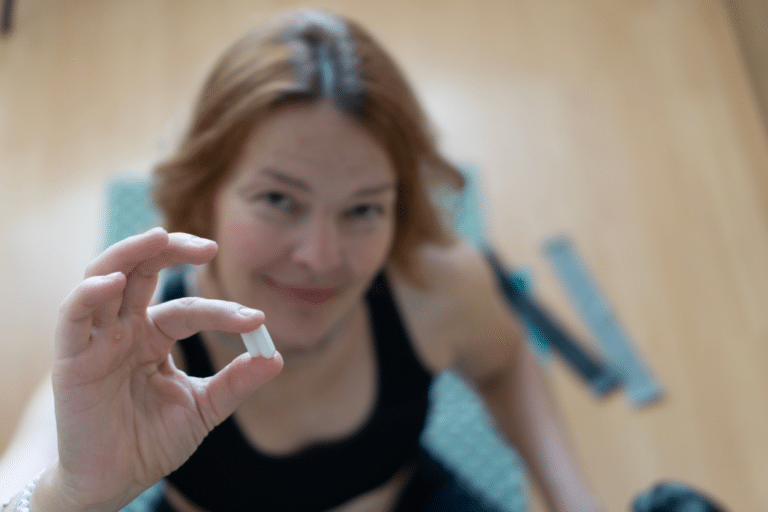Inflammation gets a bad rap, but it is not always the enemy. Acute inflammation is actually your body’s first responder system. It helps you heal after an injury or fight off an infection. The problem comes when inflammation sticks around long after the original problem has resolved or when a chronic condition shows up and turns up the heat on your body.
This can turn into chronic inflammation, and chronic inflammation is directly linked to accelerated aging and increased risk of diseases that shorten women’s longevity: heart disease, Alzheimer’s, osteoporosis, autoimmune disorders, and even certain cancers.
For women in midlife, hormonal changes make this even trickier. As estrogen declines, the natural anti-inflammatory effects of this hormone diminish. Suddenly, low-grade inflammation can flare up, showing up as joint stiffness, weight gain around the middle, brain fog, or fatigue. These are not just “annoyances.” They are early warning signs that your body’s longevity systems are under stress.
The Science of “Inflammaging”
Researchers actually have a term for this: inflammaging. It describes the slow burn of chronic inflammation that chips away at tissues, blood vessels, and brain health over time.
- Cardiovascular health: Inflammation damages the endothelium, the delicate lining of blood vessels, making it easier for plaque to build up. And as we know, cardiovascular disease is the number one killer of menopausal women.
- Bone health: Chronic inflammation speeds up bone breakdown, raising fracture risk.
- Brain health: Inflammatory molecules cross into the brain, impairing memory and cognition.
- Metabolism: Inflammation fuels insulin resistance, a precursor to diabetes and stubborn midlife weight gain.
Lifestyle as Medicine
As a functional health coach, the first line of defense in my practice is always lifestyle:
- Sleep: Deep, restorative sleep lowers inflammatory markers. I know this is challenging for MANY women in perimenopause and menopause, which is why it’s so important to find the sweet spot of hormone harmony.
- Movement: Strength training and regular activity dial down inflammation. It also helps muscles use glucose more effectively.
- Nutrition: A diet rich in colorful plants, omega-3 fats, and minimal ultra-processed foods is anti-inflammatory by design.
- Stress management: Chronic stress keeps cortisol and inflammatory cytokines elevated and is at the root of almost all hormone imbalances.
But sometimes lifestyle shifts are not enough. That is where targeted supplementation can help.

Want to create a custom longevity health plan?
You’re in the right place.
I can help you with a functional approach to midlife women’s health including hormone balance, gut health, autoimmune issues, bone health, heart health and more!
Supplements That Support Inflammation Balance
1. Arterosil
Arterosil is a unique supplement designed to restore the glycocalyx, a protective gel-like lining on the inside of your blood vessels. Think of the glycocalyx as Teflon for your arteries. It helps keep blood flowing smoothly and reduces the sticky buildup that leads to heart disease. Studies suggest that damage to this lining (often caused by chronic inflammation, stress, and poor diet) is a major driver of cardiovascular aging. Supporting the glycocalyx with Arterosil not only helps protect the heart but also preserves vascular flexibility, a key marker of longevity in women.
2. Curcumin
Curcumin, the active compound in turmeric, has been studied for decades for its anti-inflammatory effects. The challenge is absorption, since most curcumin supplements barely make it into the bloodstream. Theracurmin uses a special process to dramatically increase absorption, making it far more effective. It has been shown to lower inflammatory markers, support joint comfort, and improve blood vessel function. For women concerned about brain health, there is also evidence that curcumin can reduce amyloid plaques and protect memory.
3. Omega-3 Fatty Acids
EPA and DHA from fish oil are some of the most studied anti-inflammatory nutrients. They lower levels of inflammatory cytokines and improve cardiovascular health by supporting healthy cholesterol and triglyceride levels. Omega-3s also help reduce joint stiffness and support brain function. For women, regular intake of high-quality fish oil or algae-based omega-3s can reduce inflammation that drives both heart disease and cognitive decline.
4. Magnesium
Magnesium is a mineral that plays a role in over 300 biochemical reactions in the body, including the regulation of the stress response and inflammation. Magnesium was once abundant in soil (and thus, our food), but modern farming practices have caused serious magnesium depletion, and many people don’t get enough in their diets. Low magnesium is linked to higher levels of C-reactive protein, an inflammatory marker. Supplementation can improve sleep, reduce muscle cramps, calm the nervous system, and support balanced blood sugar. All of these are critical for managing inflammation and protecting long-term health.
5. Resveratrol
Resveratrol is a polyphenol found in grapes, berries, and red wine. It has been shown to activate longevity pathways in cells and reduce oxidative stress and inflammation. For women, resveratrol may help support vascular health, lower insulin resistance, and protect against bone loss. Its role in reducing neuroinflammation also makes it a candidate for supporting cognitive longevity.
6. Quercetin
Quercetin is a plant flavonoid with strong antioxidant and anti-inflammatory properties. It stabilizes mast cells, which are immune cells that release histamine and inflammatory mediators. Quercetin has been shown to reduce allergy symptoms, support vascular health, and protect mitochondria, the energy producers in cells. By calming overactive immune responses, quercetin can help women reduce the daily burden of low-grade inflammation.
Pulling It All Together
Longevity is not just about adding years to your life. It is about protecting the quality of those years. Chronic inflammation is like a slow leak in your tire. You may not notice it at first, but eventually it affects every system in your body.
The encouraging news is that you have tools. Prioritize sleep, strength, stress management, and whole-food nutrition. And consider targeted supplements like Arterosil, Theracurmin, and the other allies described above to support your blood vessels, calm the inflammatory cascade, and protect your brain and bones.
Your body has remarkable resilience. With the right support, you can slow down inflammaging and create decades of stronger, clearer, more energized living. If you’d like to create a longevity health plan for yourself, I’ve created a framework I call VIBRINT. Using these 7 areas, I help my clients create a functional health roadmap for longevity.
References
- Franceschi C, Garagnani P, Parini P, Giuliani C, Santoro A. Inflammaging: a new immune–metabolic viewpoint for age-related diseases. Nat Rev Endocrinol. 2018;14(10):576–590.
- Libby P. Inflammation in atherosclerosis. Nature. 2002;420(6917):868–874.
- Katakam SK, Trivedi PP, Soni I, Tiwari SK, Tiwari M. Curcumin and its derivatives: biological activities and therapeutic potential. Pharmacol Res. 2021;164:105320.
- Sugimoto K, et al. Effects of Theracurmin supplementation on endothelial function in healthy men: a randomized crossover trial. J Nutr Sci Vitaminol. 2017;63(1):59–65.
- van den Berg BM, Vink H, Spaan JA. The endothelial glycocalyx protects against myocardial edema. Circ Res. 2003;92(6):592–594.
- Broekhuizen LN, et al. Endothelial glycocalyx as potential diagnostic and therapeutic target in cardiovascular disease. Curr Opin Lipidol. 2009;20(1):57–62.
- Calder PC. Marine omega-3 fatty acids and inflammatory processes: Effects, mechanisms and clinical relevance. Biochim Biophys Acta. 2015;1851(4):469–484.
- Rosanoff A, Weaver CM, Rude RK. Suboptimal magnesium status in the United States: are the health consequences underestimated? Nutr Rev. 2012;70(3):153–164.
- Baur JA, Sinclair DA. Therapeutic potential of resveratrol: the in vivo evidence. Nat Rev Drug Discov. 2006;5(6):493–506.
- Li Y, Yao J, Han C, et al. Quercetin, inflammation and immunity. Nutrients. 2016;8(3):167.
Dr. Anna Garrett is a menopause expert and Doctor of Pharmacy. She helps women who are struggling with symptoms of perimenopause and menopause find natural hormone balancing solutions so they can rock their mojo through midlife and beyond. Dr. Anna is the author of Perimenopause: The Savvy Sister’s Guide to Hormone Harmony. Order your copy at www.perimenopausebook.com.
Dr. Anna is available for 1-1 consultations. Find out more at www.drannagarrett.com/lets-




